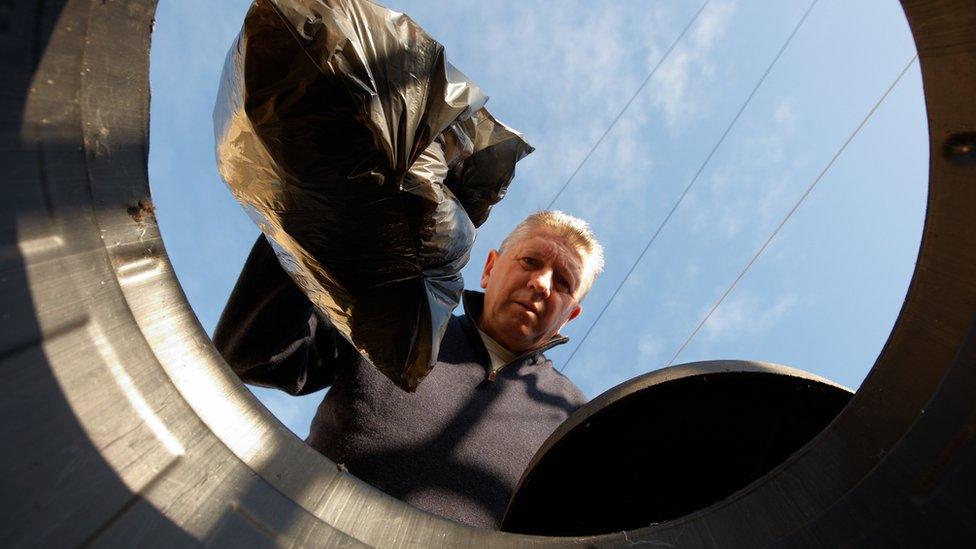Councils 'in the dark' over future funding amid cash warnings
- Published

Councils have a legal duty to provide a range of services, including waste collection
Councils in England and Wales have warned they are "completely in the dark" about how much money they will get from central government next year.
The Local Government Association says councils need "urgent guarantees" they will get enough to provide key services like child protection and social care.
More than 90 of its members fear they will run out of money to meet their legal obligations within five years.
Ministers said councils had been given extra funding for vulnerable residents.
The Department for Housing, Communities and Local Government said total funding for local authorities had gone up by nearly 3% this year to Ā£46.4bn, with an extra Ā£650m to help councils provide care for the elderly.
Real-terms fall
The recent cash crisis at Northamptonshire County Council - which is to be scrapped and replaced by two separate new authorities - has highlighted the financial plight facing local government.
Ahead of the start of the LGA's annual conference in Bournemouth on Tuesday, council leaders have warned the future financial viability of other local authorities is in doubt.
Increasing demand on councils for adult social care and children's services meant likely cuts elsewhere, the body - which represents more than 300 councils - warned.
Nearly 50 councils have told the organisation they may not be able to fund services they are legally obliged to provide - such as care for the elderly, shelter for homeless people, bin collections and libraries - by 2022-3.
A further 40 or so councils fear they will run out of money to properly fulfil their legal duties by 2024-5.
The annual funding councils get from government each year has fallen 49% in real terms since 2010.
In 2016, councils agreed a four-year financial settlement with the government, giving them greater financial freedom in return for shouldering more responsibility for care provision and hitting efficiency targets.
'Funding gap'
But hopes many councils would become virtually self-funding by the end of the decade, by allowing them to retain up to 75% of the business rates they charge on High Street shops, have proved optimistic as financial pressure on their core services has grown more acute.
According to the LGA, the funding "gap" facing local government is set to rise from an estimated Ā£3.1bn next year to Ā£8bn by 2024-5 unless urgent action is taken.
Lord Porter, the outgoing chair of the organisation, said the situation was not helped by uncertainty over Brexit and the Conservative leadership.
James Brokenshire has insisted government is listening to councils' concerns
The Conservative peer, who will step down this week, said whoever succeeds Theresa May in Downing Street must make the financial sustainability of councils their top priority in the government's Spending Review due in the autumn.
"Councils would normally have started their budget-setting planning process but remain completely in the dark about how much funding they will have next year," he said.
"Communities relying on the vital local services that make a difference to their lives deserve better.
"Urgent guarantees are needed that councils will have the funding they need to ensure our vital public services survive the uncertainty ahead."
Care pressures
At the very least, he said ministers must confirm the continuation of key funding programs, such as the Better Care Fund, worth Ā£1.8bn this year.
He also called again on local authorities to be able to raise council taxes by whatever amount they felt necessary without having to get the consent of residents through a referendum if increases were deemed excessive.
Both Tory leadership contenders, Jeremy Hunt and Boris Johnson, have pledged more money for social care although this could be put in doubt by a no-deal Brexit.
The government is currently consulting on local authorities' changing financial needs and resources, the outcome of which is likely to influence future funding settlements.
Communities Secretary James Brokenshire has said ministers recognise the financial pressure on councils and have sought to meet their demands for more resources.
These include Ā£4.3bn in ring-fenced resources for adult social care this year, Ā£100m to end rough sleeping and nearly Ā£60m to help councils prepare for the UK's departure from the EU.
In a statement, the department said councils had received nearly Ā£200bn over the past four years and their future needs would be considered in the Spending Review.
"Ultimately councils are responsible for managing their own resources and we are working with local government to develop a funding system for the future," it said.